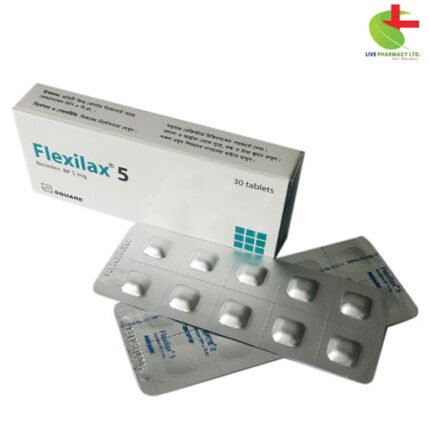Flexilax 10
100.00৳ Strip
- Flexilax offers effective relief from spasticity associated with multiple sclerosis, rheumatic disorders, and spinal cord injuries.
- Powered by Baclofen, it modulates spinal reflexes, easing flexor spasms, pain, and rigidity.
- Tailored dosages cater to adults and children over 10 years old, ensuring personalized treatment.
- Trust Flexilax for targeted relief and improved quality of life.
 Brand
Brand
|
Square Pharmaceuticals PLC |
|---|---|
 Generics
Generics
|
Baclofen |
Indications
Flexilax serves as a treatment for various conditions, including:
- Spasticity arising from multiple sclerosis
- Flexor spasms accompanied by pain, clonus, and muscular rigidity
- Skeletal muscle spasm due to rheumatic disorders
- Spinal cord injuries and related conditions
- Cerebrovascular accidents, neoplastic, or degenerative brain diseases
Pharmacology
Baclofen, the active ingredient in Flexilax, modulates both monosynaptic and polysynaptic reflexes at the spinal level by enhancing GABAB receptors, thereby reducing the release of glutamate and aspartate. Additionally, it may induce central nervous system depression and exhibit antinociceptive properties.
Dosage & Administration
For adults and children above 10 years, the recommended initial dosage is 5 mg three times daily, preferably with or after meals, with gradual adjustments up to a maximum of 100 mg per day. Children under 10 years typically commence treatment with 2.5 mg four times daily, with dosage adjustments based on individual needs.
Interaction
Flexilax may interact with various medications and substances. Combining it with agents affecting the central nervous system, alcohol, or synthetic opiates may increase sedation and respiratory depression. Concurrent use with antihypertensives may lead to a greater drop in blood pressure, necessitating adjustments in antihypertensive dosage.
Contraindications
Baclofen should not be used in individuals with hypersensitivity to any of its components.
Side Effects
Common adverse reactions associated with Flexilax include transient drowsiness, daytime sedation, dizziness, weakness, and fatigue. Other potential side effects affect various body systems, including the central nervous, cardiovascular, gastrointestinal, and genitourinary systems.
Pregnancy & Lactation
The safety of Baclofen during pregnancy is not fully established. Its use during pregnancy or lactation should be determined by weighing potential benefits against risks, and it should be administered cautiously to pregnant women only if clearly needed.
Precautions & Warnings
Special precautions should be taken when administering Flexilax to patients with impaired renal function, psychotic disorders, epilepsy, peptic ulcers, cerebrovascular diseases, or hepatic, renal, or respiratory failure. Careful monitoring of respiratory and cardiovascular function is essential, especially in patients with cardiopulmonary diseases or respiratory muscle weakness.
Overdose Effects
In the event of severe overdose, gastric lavage may be necessary.
Therapeutic Class
Flexilax belongs to the class of centrally acting skeletal muscle relaxants.
Storage Conditions
Store Flexilax below 30°C, away from light and moisture, and out of reach of children.













Reviews
There are no reviews yet.